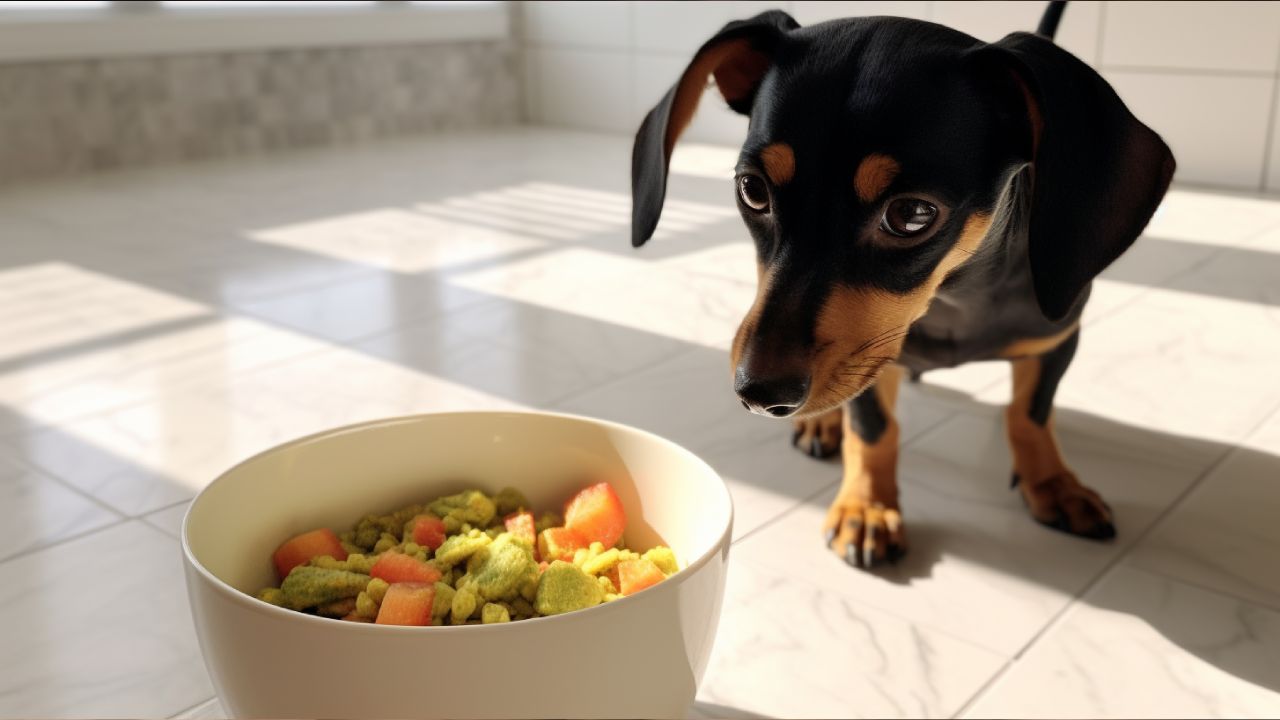Welcoming big or little puppies into your home begins an exciting journey filled with wagging tails, playful antics, and boundless love. As a responsible pet parent, your furry friend’s well-being is your utmost priority.
One of the cornerstones of ensuring their health and vitality lies in understanding the intricate world of puppy nutrition. When those adorable paws touch your floor, their nutritional needs shape their weight, growth, energy levels, and overall health.

Understanding Your Puppy’s Dietary Needs
Proteins, carbohydrates, fats, vitamins, and minerals are the vital components that shape your puppy’s growth journey, supporting everything from muscle development to a healthy coat and strong bones. Providing a balanced diet is essential for their well-being.
Essential Nutrients
From those tiny wiggles to confident strides, your puppy’s growth journey is fueled by a precise combination of essential nutrients. Proteins, carbohydrates, fats, vitamins, and minerals are the building blocks that lay the foundation for strong bones, a robust immune system, and a thriving body.
Each nutrient uniquely supports their development, making it essential to provide a well-rounded and balanced diet.
Protein, Carbohydrates, and Fats
Picture your puppy as a blank canvas, eagerly waiting for the strokes of nutrition to shape their future. Protein is the artist’s brushstroke for muscle development and repair.
Carbohydrates provide the energy for those ceaseless adventures, while fats act as the nuanced strokes that promote healthy skin and a shiny coat. Balancing these elements in their diet ensures that their growth is nurtured.
Vitamins and Minerals
Just like a puzzle coming together, including vitamins and minerals completes the picture of your puppy’s well-being. From the spark in their eyes to the strength in their steps, these micronutrients play a role that belies their size. Vitamin A supports vision, vitamin D strengthens bones, and minerals like calcium and phosphorus create a robust skeletal foundation. Each element contributes to the masterpiece of your puppy’s health.
Advice for Feeding Big Puppies & Little Puppies
For larger breed puppies, focus on carefully portioned meals to support growth without excess weight gain, choosing a formula rich in nutrients like glucosamine and chondroitin for skeletal health.
Little puppies require smaller but nutrient-dense meals, so opt for a small-breed puppy formula and offer several small daily meals to accommodate their energetic nature and growing bodies.
Feeding Larger Breeds
Just like their personalities, larger breed puppies often come with bigger appetites. These bundles of energy require carefully calculated portions to fuel their weight and growth without promoting excess weight gain.
Select a puppy food formula for their needs, considering their potential for skeletal and joint development concerns. A balanced diet rich in nutrients like glucosamine and chondroitin can help support their growth without overburdening their frame.
Catering to Little Puppies
Little puppies may be small, but they possess an abundance of energy that needs proper nurturing. Their tiny tummies might limit the volume of food they can consume, making every bite count.
Opt for a small-breed puppy formula that packs a nutritional punch in smaller portions. These formulas often have higher energy densities to meet the needs of those rapid-fire play sessions and growing bodies. Several small daily meals ensure they receive the nutrients required to flourish.

Choosing the Right Puppy Food
Commercial options provide balanced nutrition with meat as a key ingredient, while homemade diets offer customization but require careful planning and veterinary guidance.
Commercial Puppy Food
These foods have become a reliable go-to for many pet parents due to their convenience and the research that goes into their formulation. Commercial puppy foods are carefully crafted to meet the needs of growing puppies, ensuring they receive a balanced diet with the right blend of nutrients.
Look for brands that list meat as the primary ingredient and avoid artificial additives. Always consult the packaging for feeding guidelines that align with your puppy’s age and size.
Homemade Diets
For those who wish to take a hands-on approach, homemade diets allow you to tailor your puppy’s meals to their preferences and sensitivities. However, this avenue requires meticulous planning to ensure your puppy receives nutrients.
Consulting a veterinary nutritionist is paramount to creating a balanced homemade diet that supports their growth. It’s important to note that homemade diets might not be appropriate for all puppies and should be approached carefully.
How Often Should You Feed Your Puppy?
During their early months, puppies benefit from three to four daily meals to support their growth and energy levels. Around six months, many puppies can transition to a regular two-meal-a-day schedule, but monitor their energy needs and adjust as necessary.
Meal Frequency for Growing Bodies
Puppies are like little explorers, constantly moving and discovering the world around them. This boundless energy requires a steady supply of fuel. Feeding your puppy three to four meals daily is recommended during their early months.
This frequent meal schedule accommodates their rapid growth and high energy levels, ensuring they receive the nutrients they need to thrive. As they approach adolescence, they can gradually transition to fewer daily meals.
Transitioning to a Regular Feeding Schedule
As your puppy matures, their meal schedule can evolve to match their changing needs. Around six months of age, many puppies are ready to transition to a more regular feeding routine of two meals a day.
This shift mirrors adult dogs’ feeding habits and allows their digestive system to adjust to a slightly larger meal size. However, remember that puppies may have varying needs, so monitor their energy levels and adjust accordingly.
How Much Food Should You Provide?
Follow the feeding guidelines on the puppy food packaging based on factors like age, weight, and activity level. Monitor your puppy’s weight and adjust portions for steady growth, consulting your vet if necessary.
Portion Control for Optimal Growth
Portion control is the key to preventing overfeeding and ensuring your puppy grows healthy. Follow the feeding guidelines provided on the puppy food packaging as a starting point.
These guidelines consider factors like age, weight, and activity level. Remember that larger breeds may have specific recommendations due to their growth patterns. While those puppy eyes may plead for more, adhering to the recommended portions promotes steady, controlled growth.
Monitoring Your Puppy’s Weight and Growth
Your puppy’s weight is a valuable indicator of their overall health. Regularly weigh your puppy and observe their body condition to ensure they’re neither underweight nor carrying excess pounds.
If you notice your puppy’s ribs becoming overly prominent or they’re gaining weight too rapidly, it’s time to adjust their portions. Please consult your veterinarian for guidance on portion adjustments and dietary changes to align with their growth trajectory.
Navigating Dietary Changes as Your Puppy Grows
As your puppy grows, transition to adult food around 12 months, with larger breeds possibly continuing puppy food longer. Consult your vet about switching to senior-specific food for senior dogs to meet their changing needs.
Puppyhood to Adulthood
Time flies, and before you know it, your rambunctious puppy is stepping into adulthood. As they bid farewell to their puppy days, adjusting their diet to support their evolving needs is essential.
Typically, small to medium-breed puppies can transition to adult food around 12 months of age, while larger breeds might benefit from continuing puppy food for a bit longer. Gradually introducing adult food helps prevent digestive upsets and ensures they receive the proper nutrients for their current life stage.
Special Considerations
As your furry companion gracefully ages, their dietary requirements undergo yet another transformation. Senior dogs have different needs compared to their younger counterparts.
Their metabolism might slow down and require fewer calories to maintain a healthy weight. Senior-specific dog food formulas cater to their changing nutritional needs, supporting joints, digestion, and overall vitality. Consult your veterinarian to determine when to transition your senior pup to specialized food.
Real-Life Stories of Puppy Nutrition in Action
Max, the Labrador, and Bella, the Chihuahua, thrived with customized diets that matched their growth and energy levels.
Balancing a Big Puppy’s Growth Spurts
Meet Max, a playful Labrador with a zest for life. Max’s puppyhood was marked by rapid growth spurts that left his owner wondering how to balance his nutritional needs without promoting excessive weight gain.
By consulting a veterinarian, Max’s owner devised a feeding plan that accounted for his breed’s growth patterns. Max’s growth trajectory remained steady and healthy with portion control, nutrient-dense food, and regular exercise.
Small Puppy, Big Personality
Bella, a petite Chihuahua, proved that size doesn’t limit personality. However, her small stature came with specific nutritional considerations. Bella’s owner chose a small-breed puppy formula that provided the energy density required to match her boundless energy levels.
Through careful monitoring and portion adjustments, Bella’s owner ensured she received the nutrients needed to support her active lifestyle and keep her tiny tail wagging.
These real-life stories serve as reminders that each puppy’s journey is unique. By adapting their diet to their specific needs, we can celebrate their growth milestones and support their well-being at every life stage.

Expert Advice from Veterinarians and Canine Nutritionists
Consulting veterinarians and canine nutritionists provide tailored guidance for your puppy’s diet, ensuring their optimal growth and well-being. Regular check-ups with your vet help fine-tune their nutrition.
Seeking Professional Guidance for Tailored Nutrition
When it comes to your puppy’s diet, the wisdom of experts can make all the difference. Veterinarians and canine nutritionists possess a wealth of knowledge that goes beyond the labels on food bags.
Consider seeking their guidance if you need clarification on your puppy’s dietary needs. They can offer tailored advice based on your puppy’s breed, age, weight, and any specific health concerns. Their expertise ensures your puppy receives a diet supporting its growth and overall well-being.
Consulting Your Vet
Your veterinarian is not just a source of medical care; they’re your partner in ensuring your puppy’s health and happiness. Regular check-ups provide opportunities to discuss your puppy’s nutritional needs, track their growth, and address concerns.
Whether planning dietary changes or seeking guidance on portion adjustments, your vet’s insights are invaluable. Together, you can navigate the nuances of puppy nutrition and make informed choices that set your puppy on a bright and vibrant future.
Conclusion
As you witness your puppy’s growth, you can shape its path toward a future filled with vitality and joy. Every meal and choice you provide contributes to their development and well-being.
By understanding the essentials of puppy nutrition, you’ve embarked on a journey of care, love, and responsibility. From choosing the proper nutrients to transitioning their diet as they mature, you’ve equipped yourself with the tools to ensure your puppy thrives in every aspect of their life.

FAQs
Can I feed my puppy the same food as my adult dog?
Puppies have unique nutritional needs for growth and development. While some adult dog food might be suitable for all life stages, it’s best to choose a high-quality puppy food formulated to meet their requirements.
Can I give my puppy table scraps or leftovers?
It’s recommended to avoid giving your puppy table scraps or leftovers. These might lack essential nutrients or contain ingredients harmful to dogs.
What if my puppy is a picky eater?
Puppies can be picky, but it’s important not to give in to their demands for human food. Consistency is key. If your puppy consistently refuses meals, consult your vet to rule out any underlying health issues.
Is it okay to switch puppy food brands?
If you switch puppy food brands, do so gradually over several days to avoid digestive upset. Mix a small portion of the new food with the old food, gradually increasing the proportion of the fresh food.
Can I give my puppy treats?
You can give your puppy treats, but they should only make up a small portion of their diet. Choose high-quality, puppy-specific treats and factor them into their daily caloric intake to avoid overfeeding.






0 Comments